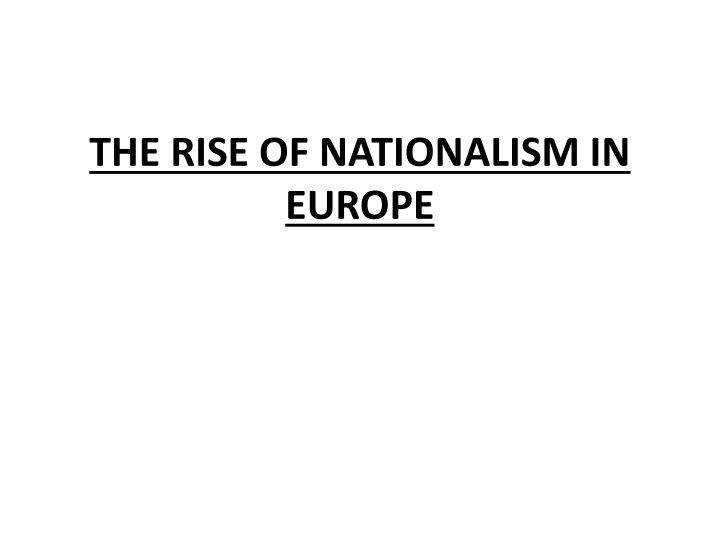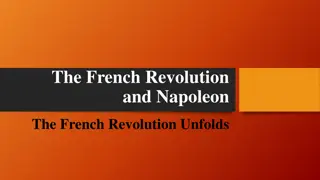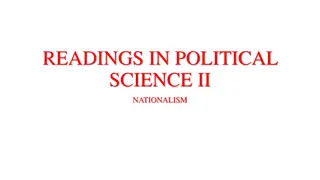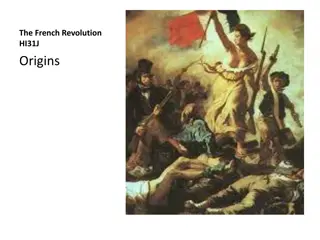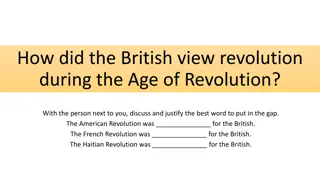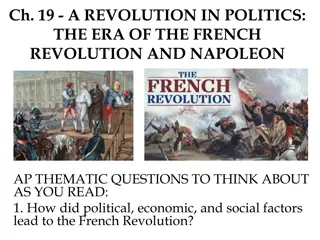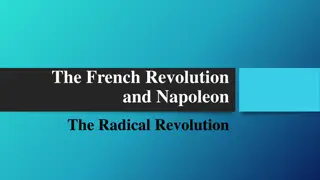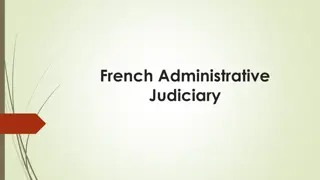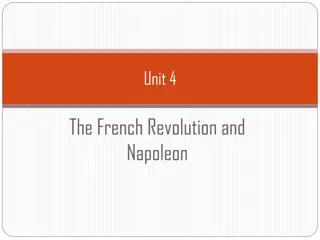The Rise of Nationalism in Europe: French Revolution and Revolutionary France
The rise of nationalism in Europe during the French Revolution and Revolutionary France era is explored, defining key terminologies like Absolutist Institutions, Utopian, Charter of the Rights of Man, Nation State, Modern State, and Multi-National Dynastic Empires. The French Revolution marked the first clear expression of nationalism, emphasizing collective identity and introducing measures like the tricolor flag, centralized administration, and promoting the use of French language. Revolutionary France aimed to liberate Europe from despotism, leading to the formation of Jacobin clubs in various European countries.
Download Presentation

Please find below an Image/Link to download the presentation.
The content on the website is provided AS IS for your information and personal use only. It may not be sold, licensed, or shared on other websites without obtaining consent from the author.If you encounter any issues during the download, it is possible that the publisher has removed the file from their server.
You are allowed to download the files provided on this website for personal or commercial use, subject to the condition that they are used lawfully. All files are the property of their respective owners.
The content on the website is provided AS IS for your information and personal use only. It may not be sold, licensed, or shared on other websites without obtaining consent from the author.
E N D
Presentation Transcript
THE RISE OF NATIONALISM IN EUROPE
CONTENTS IMPORTANT TERMENOLOGIES FRENCH REVOLUTION & THE IDEA OF THE NATION. ROLE OF NAPOLEON ASSINGMENTS
IMPORTANT TERMENOLOGIES Absolutist Institutions: Institution that has no restraints on the power exercised . In history it refers to a form of monarchical government that was centralized, militarized and repressive. Utopian: A vision of a society that is so ideal that it is unlikely to actually exist. Charter of the Rights of Man: It is one of the most important outcome of French Revolution. It explains a list of rights such as Freedom of religion, speech , assembly and separation of powers.
IMPORTANT TERMENOLOGIES Nation State: A Nation State was a state where majority of its citizens develop a sense of common identity and shared history through (a) Struggles against common enemy (b)Actions of Leaders and (c) participation and involvement of common people. Modern State: A Modern State is a state where centralized power exercised sovereign control over a clearly defined territory. Multi-National Dynastic Empires: Multi-National Dynastic Empires were the Empires that extends more than one region or country or continent. Here military might of the rulers were the binding forces.
FRENCH REVOLUTION & THE IDEA OF THE NATION. The first clear expression of Nationalism came with the French Revolution of 1789. The revolution proclaimed that the people constitute the nation and shape its destiny. 1. Sense of collective identity: It is the pre- requisite of a Nation state. The French revolutionaries introduced the following measures and practices to develop it. (a) The Idea of The Fatherland and The Citizen to developed the notion of a united community enjoying equal rights under a new constitution. (b) A new French flag ,the tricolor replacing former royal standard.
(c) Assembly. (d) martyrs commemorated, all in the name of Nation. (e) A centralized administrative system was introduced with uniform laws for all. (f) Abolition of internal customs duties and introduction of uniform weight and measure. Renaming of The Estates General as National New hymns were composed, oaths taken and
(g) French became the common language of the nation discouraging Regional dialects. 2. REVOLUTIONARY FRANCE AND THE EUROPE : Revolutionary France declared that it was the mission and the destiny of it to liberate the people of Europe from despotism to become nations. As a result Jacobin clubs were formed in different European countries and prepared the way for French armies to move into Holland, Belgium, Switzerland and much of Italy in 1790 s.
ROLE OF NAPOLEON 3. THE CIVIL CODE OF 1804/ NAPOLEONIC CODE: Through a return to monarchy Napoleon had destroyed democracy in France , but in the administrative field he introduced revolutionary principles to make the whole system rational and efficient. Important features of his reforms were : (a) Abolition of the system of privileges on birth. (b)Established equality before the law. (c ) Introduced the right to property.
(d)Simplified administrative divisions (e) Abolished the Feudal system and freed peasant from serfdom and manorial dues. (f) Abolished guild (Association of Traders) restrictions. (g) Improved Transport and Communication system.
4. mixed. Peasant, artisans, workers and new businessmen enjoyed due to new found and uniformity. However the reaction of the people of European countries under French were mixed. Initially they welcome the French armies as harbinger of liberty. But it turned into hostility due to the following reasons :- (a) Administrative reforms were not going hand in hand with political freedom. REACTION OF THE PEOPLE: Reaction was freedom
(b) Increased taxation imposed by Napoleon. (c ) Censorship or restriction on freedom of press or expression. (e) Forced conscription into French armies.
ASSINGMENTS 1. What were the steps taken by French Revolutionaries to create a sense of collective I identity among the people? Write a short note on the civil code of 1804/ Napoleonic code of 1804. Initially French armies were welcomed as harbinger of liberty, but it soon turned to hostility. Explain. 2. 3.
Assignments : OBJECTIVE QUESTIONS 1. Which country became full-fledged territorial state in Europe in the year 1789? (a) Germany (b) France (c) England 2. When was the first clear expression of nationalism noticed in Europe? (a) 1787 (b) 1759 (c) 1789 (d) 1769 (d) Spain
Which newly designed flag was chosen to replace 3. the formal flag Royal Standard in France? (a) Union Jack (c) White Saltire 4. Which of the following reforms made the whole system in France more rational and efficient? (a)Administrative reform (b) Social reform (c) Economic reform 5. Who destroyed democracy in France? (a)Adolf Hitler (c) Napoleon Bonaparte (b) Tricolour (d) Red Cross (d) Political reform (b) Mussolini (d) Bismarck
TRUE/ FALSE 1. Jacobin clubs influenced German Army. 2. The Napoleonic Code upheld reforms and equality. ASSERTION AND REASON Assertion : From the very beginning, the French revolutionaries introduced various measures and practices like the idea of la patrie and le citoyen. Reason : This was done to create a sense of collective identity amongst the French people.
